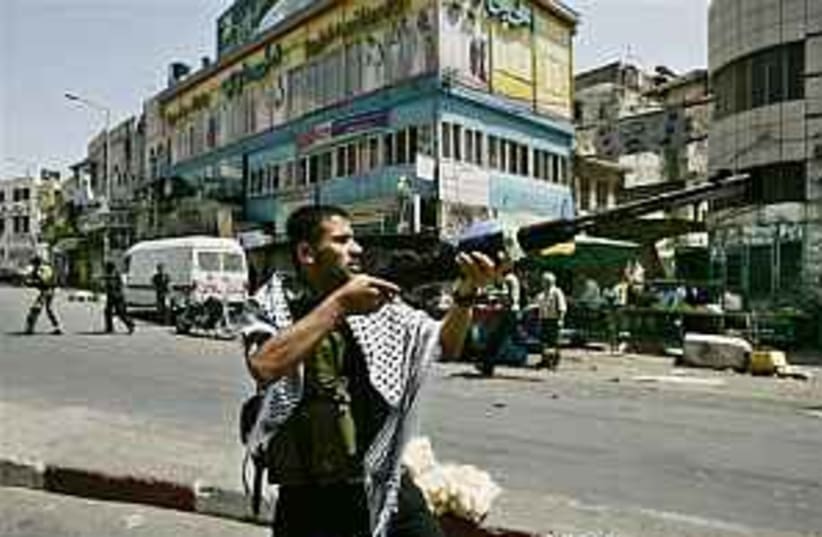Many observers are watching to see whether Fatah's sixth General Assembly will advance or retard the prospects for relaunching negotiations between Israel and the Palestinians. There is great international interest in the Fatah assembly since so much of the international community perceives the Palestinian problem as the key to the entire spectrum of conflicts in the Middle East.
The crucial question: Is Fatah going to waive the principle of "armed struggle" and devote itself to peace talks based on compromise?
The two relevant documents to be discussed and approved by the congress are the political program and Fatah's "internal order." The political program might be seen as reflecting progress in terms of accepting a political solution and rejecting violence - but it falls short of waiving the principle of armed struggle.
The real problem lies in the internal order document, which restores all of the phrases that were omitted in the political program. While the political program sought to subordinate the struggle to the need for "international legitimacy," the internal order is very clear in rejecting all international peace initiatives.
The political program might be seen by many as reflecting progress in terms of accepting a political solution and rejecting violence, but it falls short of waiving the principle of armed struggle. It endorses the Arab Peace Initiative, talks vaguely of the Palestinian "right of return" - using a formula "based on UN Resolution 181" and not on fulfillment of this resolution, and offers the model of the "Intifada of the Stones" - the first intifada - as preferred over the model of military struggle.
The principle of "armed struggle" is mentioned as an option of the past that must be re-examined in comparison to other options of struggle. The model seen to fit our times is the anti-wall campaigns in Nil'in and Bil'in, but "10,000 times as fierce." The political program uses the term "the struggle" (not quite describing it as the "armed"), and even the "peaceful struggle."
However, there is more than one reference to the term "the struggle of all options," that includes the armed struggle as well. One of the methods mentioned in the political program for the "peaceful intifada" is an economic boycott of Israel.
But in an interview with Maan News, the Fatah leader in Lebanon, Sultan Abu al-Einein, made it clear that the "struggle of all options" includes the armed struggle as well.
Developing the Nil'in-Bil'in model of struggle is problematic because it can easily deteriorate into violence, as past experience shows, but the real problem lies in the internal order document. All of the phrases that were omitted in the political program are present in this would-be "bureaucratic" document.
The term "armed popular struggle" appears at the very beginning. And the internal order goes on to say, "The projects, agreements, and resolutions that were issued or will be issued by the UN or group of states or any separate state on the Palestinian problem that waives the rights of the Palestinians on their homeland is null and void."
Article 13 calls for "establishing a sovereign democratic Palestinian state on the entire Palestinian territory." While the political program lists the "one-state solution" as an option in case the "two-state solution" fails, the internal order document mentions the "one-state solution" as the only solution.
Should there be any question regarding Fatah's objectives, Article 17 states: "The armed popular revolution is the only inevitable way to the liberation of Palestine," while Article 19 notes: "The struggle will not end until the elimination of the Zionist entity and the liberation of Palestine."
Furthermore, Article 22 calls for: "Objection by force to all political solutions that are offered as an alternative to the extermination of the occupying Zionist entity in Palestine and all the projects that aim for the elimination of the Palestinian problem or seek to internationalize it or put an outside custodian on its people from any possible party."
This article is in contradiction to the call in the political program for greater international involvement in the problem and its welcome for the involvement of international forces in Palestine.
Article 9 states clearly that "the liberation of the Holy Land and the defense of its holy sites (that are forbidden to infidels) is an Arab, Muslim, and humanitarian duty."
And here we come to the essence: Fatah retains the armed struggle as a strategy in order to liberate the whole of Palestine and eliminate Israel.
Article 12 calls for "the liberation of Palestine completely and the elimination of the state of the Zionist occupation economically, politically, militarily, and culturally."
To sum up, while Fatah's political program tries to accommodate international expectations and seems designed to mobilize international legitimacy for the re-launching of a "peaceful intifada," its "internal order" reminds us that the Fatah ideology of the 1960s and 1970s remains deeply ingrained.
The writer is a senior policy analyst at the Jerusalem Center for Public Affairs. A veteran observer of Palestinian affairs, he formerly reported for Israel Radio and Al Hamishmar. He is the author of The Palestinians: Between Terrorism and Statehood.
